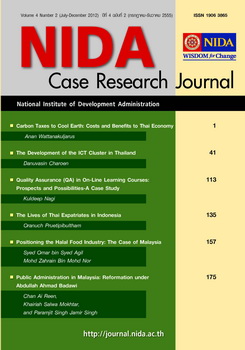Quality Assurance (QA) in On-Line Learning Courses: Prospects and Possibilities-A Case Study
Abstract
A case study is an intensive analysis of an individual unit (e.g., a person, group, or event) stressing underlying factors leading to its success or failures. In context of eLearning it is about gauging or measuring the usage of the learning objects (LOs) or components of a courseware and how a small group of learners are using them for enhancing their learning. This case study investigates the level of usage of LOs or components in an eLearning courseware by examining user’s activity logs recorded into the database of a Learning Management System (LMS). As a more direct example, the Moodle “Reports”, a tool provided within the LMS is used as a research instrument to understand the level of usage of LOs or components in a virtual learning environment (VLE). The results of the analysis of these logs can be easily used by instructors and trainers to evaluate learner’s activities and identify on-line behaviors and interaction patterns during the delivery of a courseware. Information provided by these logs can be used for analyzing and improving the quality of LOs or components. In a nutshell, this paper focuses on a simple strategy of using system logs to assess quality assurance (QA) in on-line courses.Downloads
How to Cite
Nagi, K. (2014). Quality Assurance (QA) in On-Line Learning Courses: Prospects and Possibilities-A Case Study. NIDA Case Research Journal, 4(2), 113–134. retrieved from https://so04.tci-thaijo.org/index.php/NCRJ/article/view/25103
Issue
Section
Case Study





